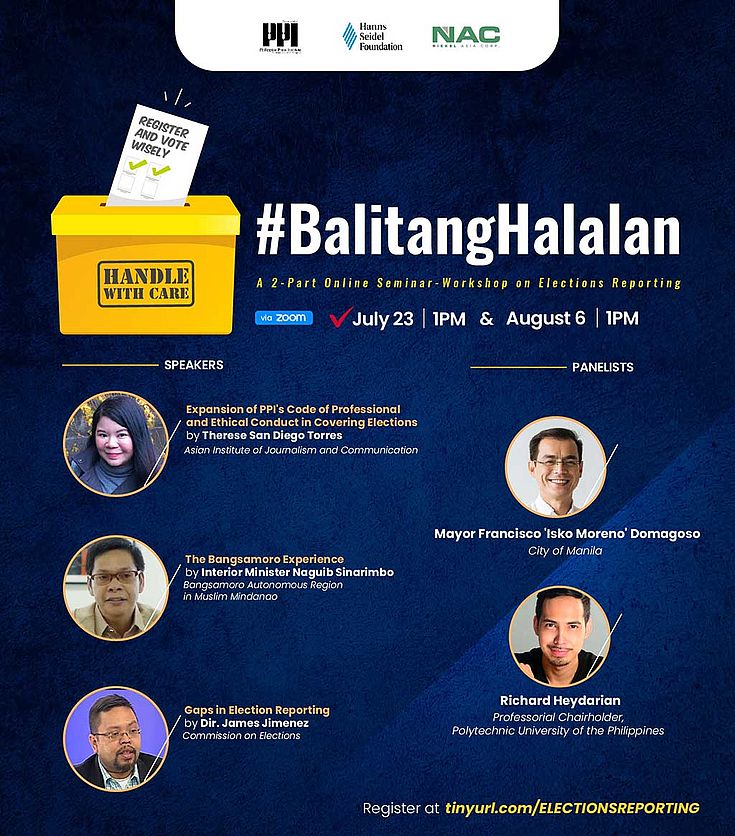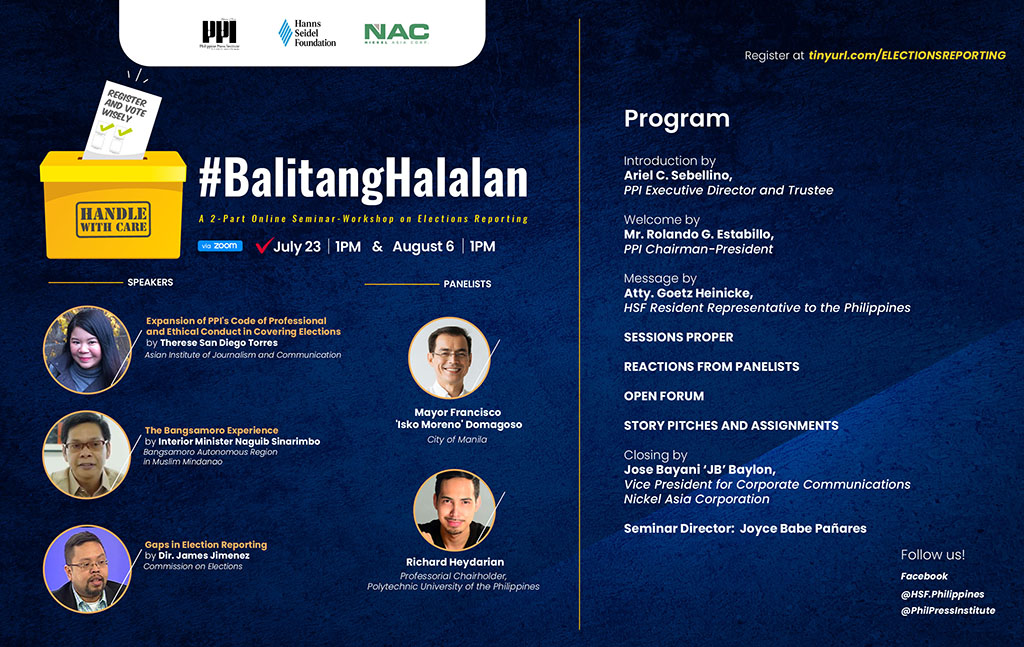Media readies for elections coverage
Journalists discuss reporting gaps and expansion of Ethics Code
#BalitangHalalan poster
PPI
How can media maintain objectivity, impartiality and balance in their reportage on the 2022 Philippine general elections? News reporters nowadays deal with challenges both online and offline in order to make accurate information available to the public in a timely manner, in the midst of a pandemic, no less. Meanwhile, questions related to the upcoming elections have begun to arise that the public expects to be updated on. To air these concerns and present clear guidelines that help media practitioners uphold ethics in journalism during these demanding times, the Philippine Press Institute (PPI) organised an online activity for its members that was attended by more than forty-five participants.
With the national and local polls set to be held on May 9, 2022, the prevailing pandemic situation has given rise to questions beyond the usual about the electoral process to include those about candidates’ campaign modalities, the length of voting period and safety for voters, amongst others. That mainstream news outlets, and especially the social platforms online, are said to be full of intermingling true and false information poses as an additional threat to the elections and to the work of news reporters.
As depicted by the moderator, “Social media democratised access but on the other hand, it also made the spread of disinformation and misinformation faster.” Therefore, news reporters need appropriate tools, techniques and information that can aid them in bringing factual and reliable news to the people.
Each of the resource speakers highlighted important points in relation to the coverage of the elections. With the past elections as reference, Commission on Elections (COMELEC) Director James Jimenez discussed challenges wrought by under-reporting on specific aspects of the elections and explained opportunities where media can gain from government briefings and focus on facets that the public needs to better understand. Human stories in the scenes are cited as a way by which people can see the importance of elections and afford it the significance that it merits. Even as emphasis was placed on individual responsibility, specific areas in relation to elections-related activities where the government sees itself able to guarantee the safety of participants, including the news reporters, were laid out.
“Elections are massive logistical orchestrations that involve hundreds of people moving in concert towards a singular goal and there are human stories in those scenes, from the delivery of supplies to the proclamation of winners. These stories are essential because they give people an important window into how important elections truly are and to what extent people go to make sure that elections are actually held. This, I think, would contribute much to people holding elections in much higher esteem than they do now.”
Director James Jimenez, Commission on Elections
“The media plays a crucial role in ensuring that voters can make informed decisions in 2022. Journalists and news outlets need to be equipped with appropriate guidelines in election reporting amid the pandemic and the evolving challenges in the digital media landscape,” Therese San Diego Torres of the Asian Institute of Journalism and Communication (AIJC) emphasised. She delved into need to update the Code of Professional and Ethical Conduct in Covering Elections and discussed excerpts from the expanded code that are expected to help extend guidance to journalists and news outlets in carrying out their reporting duties meanwhile upholding ethical and professional standards in the prevailing news landscape.
“Social media democratized access but on the other hand, it also made the spread of disinformation and misinformation faster.”
Joyce Panares, Editor, The Manila Standard
Bangsamoro Autonomous Region in Muslim Mindanao (BARMM) Interior Minister Naguib G. Sinarimbo gave insights into elections coverage in the Region, with the reminder to seek understanding of the context of elections in a place where the “long-standing tradition of leadership” has been “concentrated in the families who have ruled for a long time.” This was to signal to the media to be mindful of the transition phase the Region sees itself in as it prepares to hold its first elections for purposes of legitimacy, possibly in 2025, if not in 2022. He also described the lack of access of news outlets to information in the region due, amongst others, to geographical structure and that contributed to the delayed or otherwise under- / absence of reporting on topics needing to be aired and expressed hope for the “digital revolution” to provide chances for voices to be heard.
“We have a very strong institution of sultanate that have survived from the thirteenth century all the way to the nineteenth century, before we lost sovereignty as a result of the colonisation of the Americans. So that kind of a leadership, although the institution itself has been abolished by the Americans, it sits in the subconscious of the people…in the culture in the tradition and in the mindset of our people. When looking at elections in a region…, we must always be conscious that this region is still very much in transition, moving towards a different kind of political system, that’s going through elections for purposes of legitimacy for leadership. In the tradition, that is not how leadership has been selected. Elections are very much decided by clans.”
Interior Minister Naguib G. Sinarimbo, Bangsamoro Autonomous Region in Muslim Mindanao
In his analysis of the election landscape, Polytechnic University of the Philippines Professorial Chairholder Richard Heydarian raised awareness on the absence of legislation in relation to foreign interference and financing in elections, the need for media to be “robust and credible” and at the same time “dynamic,” and the demand for facts to be presented in more interesting ways, particularly for the younger generation. How people in positions of capacity and responsibility should work in a collaborative relationship to help ensure the elections are held in the most optimal way possible was stressed. Best practices in other countries were named as possible references, both in terms of the handling of the elections and the coverage thereof.
In elaborating how his close coordination with the press and use of various means of information dissemination to the public is integrated into his brand of open governance, City of Manila Mayor Francisco Domagoso asserted, “Media coverage can be utilised as a bridge to communicate messages, especially in times of chaos, so that people will get right, enough, proper information. ( … ) If the medium -- media, social media, all others -- being utilised properly, I think it will help the people to have full picture of the real situation.”
“The media plays a crucial role in ensuring that voters can make informed decisions in 2022. Journalists and news outlets need to be equipped with appropriate guidelines in election reporting amid the pandemic and the evolving challenges in the digital media landscape.”
Therese San Diego Torres, Asian Institute of Journalism and Communication
Answers gathered from participants through a live poll on “gaps in election coverage” ranged from absence of coverage and of fact-checking; lack of reporting on candidates’ background and analyses of their campaign platforms, especially on opposition candidates; elections violations and other irregularities; need for reliable and timely information from the COMELEC; to the experiences and apprehensions of election workers and ‘basic sectors’; all the way to voter education and post-elections coverage of elected officials.
With due consideration for the pandemic situation, the COMELEC is set to publish modified campaigning guidelines, which are expected to be released in time for the candidates’ filing of Certificates of Candidacy (COC’s), the period for which is from 01 to 08 October 2021. Said guidelines are to take effect upon the start of the respective campaign periods of candidates for both national and local positions.
Election campaigns are expected to flood the digital space, such as via social media. In the absence of laws regulating its use in campaigning by candidates, government monitoring will focus on campaign spending and Republic Act 9006 or the “Fair Election Act” will be upheld.
Given the “evolving challenges of the digital media landscape” and the prevailing pandemic situation, the PPI and the AIJC saw the need for journalists and news outlets to be equipped with appropriate guidelines in elections reporting. Thusly, both have been working in consultation with PPI members across the country to update the PPI’s Code of Professional and Ethical Conduct in Covering Elections. This is being done with help from other media and election experts as part of a project with the United Nations Educational, Scientific and Cultural Organization (UNESCO) Jakarta, with support from the Netherlands.
Said Code was first released in 1998 by the Philippine Press Council. It discussed issues on election coverage funding, moonlighting for political parties, other potential for conflicts of interest, and the abuse of media privileges. The expanded Code is expected to be completed soon and will be posted on PPI’s Website as a document downloadable by its members and the public.
This activity highlighted under-reported areas in elections and called attention to the necessity for objective and creative presentation of factual information without sensationalism and dramatisation. It has also served to strengthen ties amongst the media, the private sector, the government and the academe, as each expressed openness and willingness to hear out other sides of the human story behind the scenes and exchanged and views on opportunities for improvement.
Amongst those factors suggested that could contribute to an improved coverage of the elections included media self-regulation, transparency in the electoral process, government-led implementation of an information and education program for voters, and an active citizenry engaged in helping mainstream news outfits report and contend with false information.
This is the first of the two-part online seminar-workshop, #BalitangHalalan (“Elections Reporting”), designed for PPI members. It is organised by the Institute with support mainly from the Hanns Seidel Foundation (HSF). To be held on 06 August 2021, Part II will include an open forum on the gaps and challenges presented by the ongoing global health situation and a workshop focusing on how media practitioners can safely navigate and cover the 2022 National Elections.
PPI


